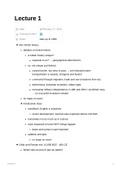Lecture 1
Date @February 17, 2022
Checked notes?
Notes isles up to 1066
intro british history
debates on british history
is british history unique?
separate to eu? → geographical determinism
no, not unique just distinct
natural barrier, but easy to pass → pre-industrial water
transportation is easiest, cheapest and fastest
connected through migration, trade and war (invasions from eu)
distinctness: industrial revolution, oldest state
increasing military independence in 19th and 20th c via British navy
→ no succesful invasions onward
no maps on exam
introduction class
newsflash: English is important
recent development: German also important before 2nd WW
humanities not as much as in science
more important to know WHY things happen
dates and names in ppt important
syllabus and ppts
no maps on exam
Celtic and Roman era: 10.000 BCE - 400 CE
british isles as part of pan-eu pattern
Lecture 1 1
, permanently settled from 10.000 BCE
first hunter-settlers, nomadic, hunting
neolithic revolution (4.000 BCE)
= transformation to agricultural society
agriculture in hamlets (small settlements)
social inequality, slavery, patriarchy
recent archealogical evidence for sexism and patriarchy:
polygamy with one man and several wives
technological developments, ex. tools from metal and stone, bronze
advanced societies
stonehenge: technically complex, stones transported from long
distance (also in eu)
emergence of celtic societies
from 6th c BCE
used by white supremacists: be skeptic!
linguistic and cultural coherence
polytheistic, close to nature
politically fragmented
written evidence is from biased sources, like Caesar
birth of roman britain
= roman colony Brittania
from 43 CE to 410 CE; via invasion
only part of isles (ca. England and Wales)
Hadrian’s wall
start of urban society due to Roman impact
roads between military camps, still used today
like Roman towns in Italy, villas, baths
other Roman impacts
Lecture 1 2
, Latin as elite language
economic development throug trade → riches for colony
introduction of christianity (only in England)
fall of roman britain
first erosion and collapse of Roman economy and urban
infrastructure
ca. 350 - 420
attacks from Ireland and Scotland → fiscal pressure → raise taxes
→ economy collapses
artisans leave cities → gradual transformation to rural society
politically abandoned by Rome and invaded by Anglo-Saxon settlers
(5th c)
agrarian orientation
end of chrisitianity and Latin
intro of Germanic languages and practices
resurgence of celtic languages and practices
“dark ages”: 5th and 6th c
cultural reset
no written sources → difficult to assess
improved living standard: taller and better fed
formation of linguistic-cultural spheres
germanic society, birth of English (Old-English)
still Celtic languages in Scottish, Irish and Welsh societies
early middle ages: 7th - 11th c
NOT Anglo-Saxon era
term used by white supremacists
(re)christianization of british isles
first in Ireland
Lecture 1 3
, 5th c CE, St Patrick (Scottish Celt, introduces christ. from Gaul)
independent from papacy up to 12th c
different from Roman catholicism
later in Scottish, Welsh, English world
7th c CE
missionaries sent to British Isles, first convert elite (top-down)
Anglo-saxon church has closer ties with papacy
Synod of Whitby
Archbishop in Canterbury
only surviving religion in British isles
religious elite have monopoly on literacy → biased texts
rise of the state (!!)
rise of the English state (9th c)
state = institution with great power and resources that governs
people
first the Heptarchy
seven rival kingdoms, each with thanes (warlord) with most
powerful the “king”
invasions from vikings (Norway and Denmark) in 9th c
influence the language in N-England
first raids but later camps on coast → promise not to attack for
tributes
Danegeld = tributes paid to vikings
king of Wessex Alfred the Great wants to stop Danegeld by
attracting mercenaries → becomes first English king
powerful: fiscal control, taxes to pay arms → birth of
bureaucracy and state
hereditary system, personality is irrelevant
counties or shires: districts with sherifs (royal official)
Lecture 1 4




